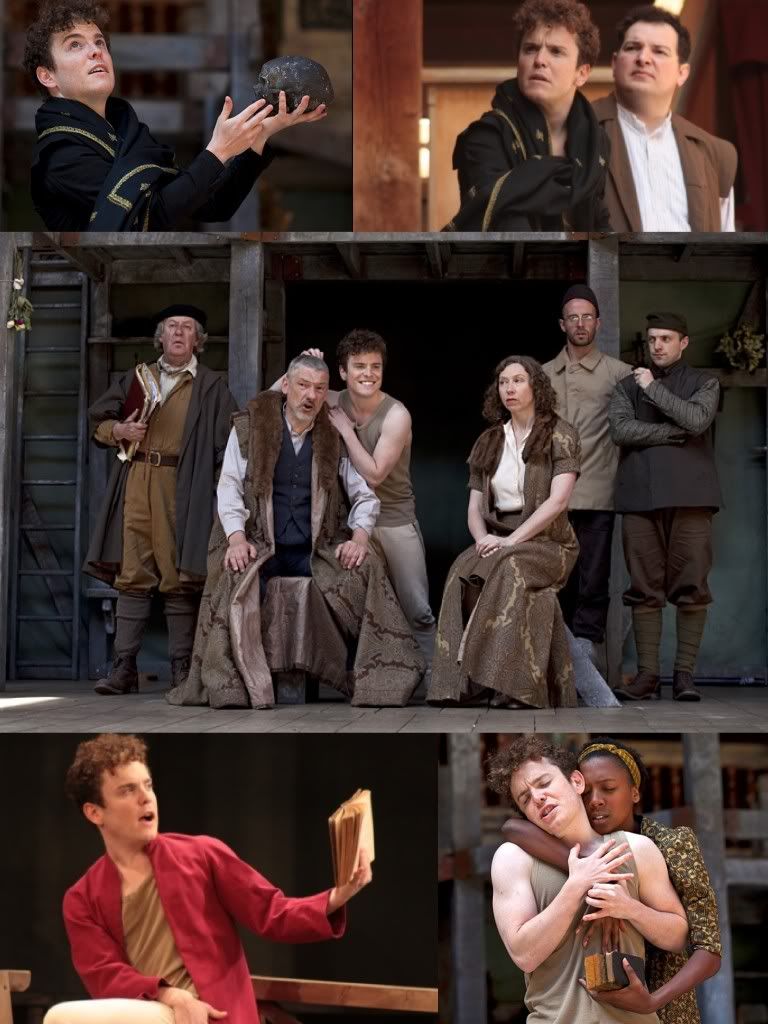God bless The Globes Hamlet, it was up against a tough challenge coming only two days after seeing Hamlet 1603, which you may have noticed I adored. In the end I think that coloured my enjoyment here, it couldn’t quite match up, which is a shame really as this is a great little touring production of the play.
I think one of the things I really liked about this is that Hamlet as a play is probably one of the most laden with preconceptions that you will find – there are certain things that we expect from productions now and linked to that I think it’s become seen as a very complex, clever, grand and almost heavy play. Here a lot of that has been stripped away, leaving a fresh, sprightly production in its wake. Though not quite as short as the White Bear production, it comes in well under three hours. I like these fast productions, I think partly it’s because it doesn’t give you time to think about everything too much, you’re dragged through the experience with Hamlet and, despite the character’s own hesitation, it gives back a sense of the desperation, intensity and urgency of his choices.
In terms of what text they’re using, which I suppose is one of the first choices any production has to make, I’ve heard this described as a bit of a mongrel – a combination of the folio and quarto texts, though another affect of the recent 1603 experience is that I would be hard torn to tell you which parts were which right now. And I think mongrel is perhaps a fitting description for a lot of this production, in the most charming way possible. I couldn’t pin this down to an exact era: for example, Hamlet’s outfit looked possibly Jacobean whilst Ophelia’s felt more like it belonged in the 1930s. Rather than being distracting though I thought this mixture of styles lent the play an ephemeral quality that I loved – it felt half like we were trapped in an old folk tale (aided by a beautiful folk song sung by the guards at the beginning) and half that we were watching something travelling players had put together, fittingly enough and well suited for the Globe. It made a refreshing change to a string of highly political versions I’ve seen so far this year.
This feeling of a travelling theatre troupe was aided as well by the small cast of eight actors producing the wide variety of characters between them. They did a good job of distinguishing between these characters and by necessity this led to some inventive staging – a particular favourite being the players scene, where Amanda Hadingue and Simon Armstrong played the Player King, Player Queen, Gertrude and Claudius between them, with a simple curtain pulled between the Globe’s pillars revealing the players scene or the King and Queen’s stony faces depending on which part of the scene they were performing. The sequence also featured a clever bait and switch at the end which I didn’t see coming.
The performances were good all round, with Joshua McGuire playing an extremely youthful Hamlet – not just because of his own young years but in the way he captured the awkwardness between being a child and becoming an adult – there was something charmingly geeky and uncertain about his portrayal. A highlight was the nunnery scene between McGuire and Jade Anouka as Ophelia, which featured a moment where they were both obviously testing their burgeoning sexuality. What really made this work for me though was the genuine affection shown between the two in the scene and the sense of childish confusion and betrayal as she attempted to return his favours.
There is, of course, one last thing to talk about – the jig. Both an integral (and awesome) part of any Globe experience and a bit difficult following a tragedy. I loved how they did it here, with Tom Lawrence’s Fortinbras starting off with a simple tap-dance to provide the rhythm as character by character the dead awoke and joined in with instruments and dancing and mad-cap, guitar wielding dashes from one end of the stage to another. Can’t imagine a better end to the evening.

No comments:
Post a Comment